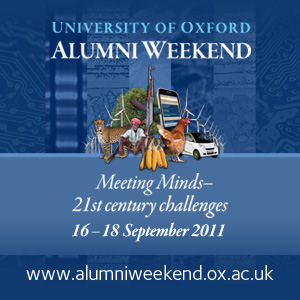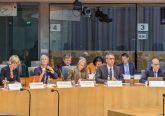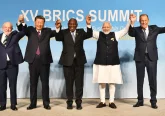 At the Alumni Weekend 2011, Dr Mark Philp, Professor Simon Caney and Dr Adam Swift discussed the issue of intergenerational justice and asked questions about how we should allocate resources inter-generationally across areas such as welfare, pensions, higher education and the environment.
At the Alumni Weekend 2011, Dr Mark Philp, Professor Simon Caney and Dr Adam Swift discussed the issue of intergenerational justice and asked questions about how we should allocate resources inter-generationally across areas such as welfare, pensions, higher education and the environment.
By means of introduction, Dr Mark Philp, Fellow and Tutor in Politics of Oriel College and a Lecturer in Politics in the University since 1983 as well as a former Head of the Department of Politics and International Relations, set out some necessary assumptions for a worthwhile discussion of intergenerational justice: a non-deterministic world in which our choices actually matter, and an absence of either huge optimism or pessimism about the future (either of which would make worrying about what we pass on to future generations pointless). Dr Philp characterised the latter point as simply a time-sensitive version of Hume’s view that it is under moderate scarcity that justice is important, rather than under absolute poverty or abundance.
Dr Philp went on to suggest that the recent surge in interest in intergenerational justice has been manifested in five main ways. First, determinism has largely been dismissed and we think of our future as open, believing that we can make a significant difference to future lives. Second, we no longer believe that future generations will necessarily be better off, not least in terms of the environment, health and poverty. Third, we think about intergenerational justice as a political problem which requires coordination and rules to protect future generations. Fourth, we question the balance between partiality and impartiality by acknowledging that our actions affect those to whom we have no relation and asking what the legitimate level of self-focus may be. Finally, we have a sense of an ideal of intergenerational justice, but struggle with how we may achieve it.
Professor Simon Caney laid out an overlapping generations model of intergenerational justice which explained the provision of education, healthcare, housing, jobs and pensions in terms of intergenerational reciprocity. However, on issues with very long time frames, such as climate change, Professor Caney argued that, with a lack of overlapping generations, the reciprocity argument begins to fail. In the absence of reciprocity, Professor Caney suggested a thought experiment in which, inspired by Rawls, we imagine a conversation with a future person and envisage what we could agree is fair for us to leave them. At the very least the fair package would include a basic set of demands not to harm future generations by destroying rights to life, food and health. Putting aside the wrangling over the methodology used in the Stern Review on climate change, it seems likely that in our intergenerational conversation it would be hard to justify not sacrificing the 1% of global GDP that the review claimed would be necessary to stabilise atmospheric greenhouse gas levels.
However, Professor Caney recognised a number of challenges which are faced in efforts to achieve intergenerational justice. The most difficult of these is overcoming the natural inclination of people to relate personally and partially to those closer to them in familial, geographic and temporal terms. This may not be a problem in the reciprocity model (indeed it may help to drive it), but when there is no scope for reciprocity partiality can be a major block. A secondary, and perhaps more soluble challenge is the myopic structure of political systems, particularly in democracies where only the current set of voters has a real say. Perhaps, Professor Caney suggested, it is time to think about redesigning our political institutions to give future generations a voice, as has been done elsewhere, by introducing structures such as committees for future generations with the task of scrutinising the impact of legislation on future generations.
Dr Adam Swift focussed on questions of temporal and relationship distance in the practical application of notions of justice. Dr Swift argued that, though there is no philosophical justification for valuing those closest to us more highly than others, in the case of the family there is an argument for a limited partiality on the basis of the goods that can only be provided by the familial environment. However, he suggested that we tend to be far better parents than citizens to such an extent that what we do for our children goes beyond legitimate partiality to harm the rest of society by keeping opportunity in the family and preventing social mobility. There is a basic trade-off between equality of opportunity and the help that parents are allowed to give to their children.
In order to determine what parents should be allowed to do for their children, Dr Swift examined the alternative of state run orphanages as a system of perfect equality of opportunity in order to reveal what is essentially valuable about families. He concluded that there are certain familial relationship goods which accrue both to children and parents that can only be achieved by familial relationships and attachments between generations that cannot happen outside of families. Nevertheless, there are many things that parents do for their children that are not necessary for the production of familial relationship goods and are therefore unacceptable. Dr Swift concluded, by means of example, that reading bedtime stories or going to cricket matches are necessary and permissible, but sending children to private school or bequeathing a house are not necessary and therefore impermissible.
Audience questions centred around trends away from the overlapping generations model of paying for public services and welfare, how to redesign political systems to tackle climate change, and the dangers of a Swiftian focus on equality of opportunity.
Professor Caney attributed the trend towards an individualistic, savings/loans-based model in provision of education and pensions to the detrimental impact of the recession, increased longevity and decreasing birth-rate on the overlapping generations model, pointing out that such a model requires generations of equal size and wealth to work in perfect reciprocal fashion.
On the issue of enabling a political solution to climate change, Professor Caney suggested three possible routes: securitising the issue to alter public perception of interests, enlightened leadership, or an intergenerational justice commission. To these, Dr Swift added that an appeal to people’s concern for the immediate impacts on their own direct descendants might prove more effective that abstract invocations of a distant apocalypse.
Dr Swift met some serious opposition to his critique of parenting excesses, including a passionate defence of the private school system and fears of totalitarianism should absolute equality of opportunity be enforced. Dr Swift emphasised that he did not oppose elite education per se (he teaches at Oxford after all!) but rather opposed the current system whereby the selection of those children that can enjoy such an education is largely in the hands of parents. Rejecting that totalitarianism is inherent in his call for equality of opportunity, Dr Swift emphasised the collective nature of the state which has always included an element of compulsion in a variety of areas. Professor Caney added that it is simply a matter of where one draws the line: even if one believes that parents should be able to do a great deal for their children, few, least of all Professor Caney, would believe that he should be able to give to his children his job as a fellow at Magdalen College along with its suite of rooms, chandelier, and view of the deer park.
Please listen to the audio podcast or watch the video podcast (both podcasts are no. 4 in the list). Please note that these recordings are not released under a creative commons licence.
Dr Adam Swift is University Lecturer in Politics, Member of the Centre for the Study of Social Justice, Fellow in Politics and Sociology, Balliol College
Dr Mark Philp is University Lecturer in Politics and Tutorial Fellow, Oriel College
Professor Simon Caney is Professor in Political Theory, University Lecturer, Director of the Centre for the Study of Social Justice, and Fellow and Tutor in Politics, Magdalen College
Oscar Schonfeld is an MPhil student at the Department of Politics and International Relations. His current research is on the selection of international mediators; he is also interested in the function of International Law.







No Comment